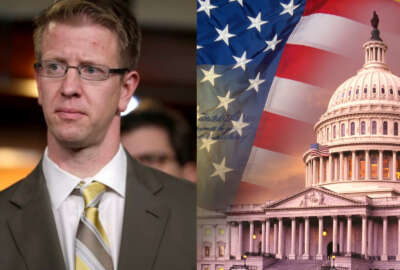Analysis: $5.5B default fails to inspire urgency over Postal Service bill
Although the word "default" might elicit a sense of urgency in most people, it doesn't appear to be inspiring lawmakers to take action on the proposed Postal...
wfedstaff | April 17, 2015 4:01 pm
Today the Postal Service will default on $5.5 billion in pension costs that it owes to the Treasury. It will do the same next month too. This isn’t a surprise. The agency has been ringing alarm bells for more than a year. It’s urging lawmakers to pass a bill letting it cut costs and restructure. But it doesn’t seem like Congress is in any rush.
“What you’re seeing in the House this week is a vote on extending current tax rates,” said Bernie Becker, a reporter with The Hill newspaper. “That’s something that all Republicans can unite behind. The postal bill has a more controversial aspect. It doesn’t go straight down party lines. It’s not an easy vote for lawmakers, so I think they’re just going to push it back to when it’s a less controversial time.”
While the word “default” might conjure up a sense of urgency in most people, it doesn’t appear to be making an impression on Congress.
“USPS has said that this is not going to affect day-to-day operations, at least in the short term,” Becker told The Federal Drive with Tom Temin and Emily Kopp Tuesday morning.
“What we’re hearing about the economy at large is that uncertainty is a problem,” Becker said. “When you don’t have certainty with what’s going to happen with the Postal Service, businesses might be more wary about mailing with them. They might go to UPS. So it’s a long term thing and they think that getting something figured out sooner rather than later is the best way to go. In the short term, you won’t see much change in how USPS operates.”
Politics slowing down action
Becker admitted political gamesmanship may be what’s slowing down passage of the Postal Service bill.
“The Postmaster General has said that [the Senate bill] on its own isn’t enough to get the Postal Service where it needs to go,” he said. “Part of what’s at play here is that the House doesn’t want to pass something that it doesn’t think is strong enough. It wants to go into conference committee with the strongest bill it can. I don’t think they think they can get that right now or that they have enough leverage right now.”
On top of all that, it’s an election year, which leads many congressmen to adopt a “wait and see” attitude about when the best time to pass the strongest bill would be.
When the Senate passed its bill, it put the kibosh on any talk of USPS closing facilities in order to save money. While that topic would seem to be something the House would be interested in doing, other factors are at play.
Punching the ‘ticket to the outside world’
“Among Republicans, the Postal Service is something that’s very near and dear to constituents, especially with Republicans in rural areas,” Becker said. “They’ve always said that this is their voters’ ticket to the outside world. They’re going to be very cautious about anything that’s going to open the door to post offices being closed, plants being closed, mail being slowed.”
In order for the Postal Service to survive in a world in which the way people are communicating is rapidly changing, Becker said USPS is going to have to consider changing the way it does business.
“It’s going to happen, but it’s a very cautious thing and there are some GOP lawmakers who are going to move very cautiously on that,” he said.
RELATED STORIES:
USPS: We will default on $5.5B payment due this week
Copyright © 2024 Federal News Network. All rights reserved. This website is not intended for users located within the European Economic Area.
Michael O’Connell is senior digital editor of Federal News Network optimizing content for the best user experience. Follow @moconnellWFED
Follow @moconnellWFED






